Braille machines with a Moving Embossing Head
The most common Braille writing machine is the Perkins.
You will find quite a few variations of these machines in a range of colours.
A Perkins Printer Attachment
After removing the base plate of a Perkins the Perkins would then sit on this device connecting it to a standard printer. This would enable both print and Braille documents to be produced.
Pic of a Perkins Printer Attachment known as a Braille and print;
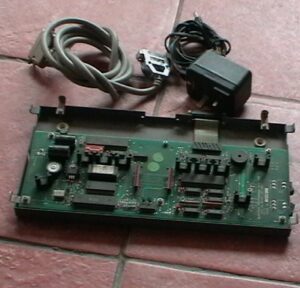
Paige Connect
This also attaches to the bottom of a Classic Perkins Brailler. Enabling the Perkins to connect to a mobile phone or tablet via Bluetooth allowing access to a dedicated web page for learning Braille.
Pic of Paige Connect:
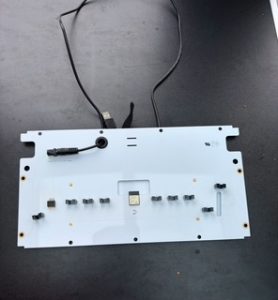
Mountbatton Brailler
This is a battery/electric Braille writing device. I do not know how it works, however it can be connected to a computer enabling it also to be used as an embosser. It has more than the usual nine keys we are used to. Grey and yellow case and black and blue keys.
Pic of Mountbatton Brailler:
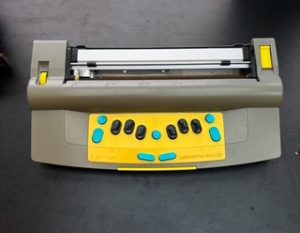
A Perkins Dymo Tape Adapter
This is a metal plate that feeds into the Perkins just like a sheet of paper. It holds a length of Dymo tape for you to write on.
Pic of a Perkins Dymo Tape Adapter;
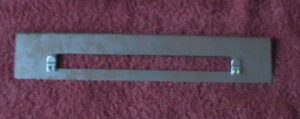
An electrically powered Perkins
This machine requires a mains power supply, this modification makes the keys easier to press.
Pic of an electrically powered Perkins;
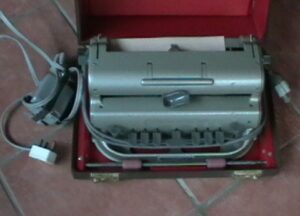
A Perkins with extension keys
Extension keys come in a range of options, some for added leveridge and others to adjust finger spacing dependant of your needs.
Pic of a Perkins with extension keys;
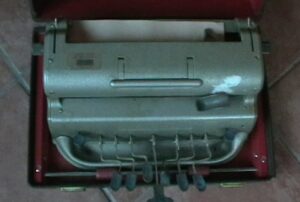
A Traditional Perkins Brailler designed by David Abraham in the 1950’s produced by the Howe Press of Perkins School for the blind in Massachusetts. This machine has approximately 500 parts. The paper is contained inside making the machine easier to transport. This is the traditional grey, however other colours such as red, blue and green are available today.
Next Generation Perkins Brailler
An a4 sheet sized Braille machine, mainly in a midnight blue or cherry red casing. The cases are plastic with white keys and easy grip paper roller knobs. Also has a facility for erasing Braille mistakes.
Pic of Next Generation:

Perkins Smart Brailler
Very much like the Next Generation Brailler. This is also an a4 paper sized machine. The same plastic casing and keys, however does have some electronic parts, mainly being a digital display screen with the option to display print or Braille characters. A file menu system and spoken feedback. Works from battery or mains power.
Pic of Smart Brailler:
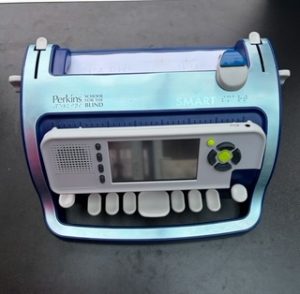
A Pyke Glauser Braille Writer
1920’s. Developed by the RNIB. This machine has no paper roller the paper passes through the machine the only moving part is the embossing head and linkage from the keys. The keys are situated with dots 1 2 and 3 on the left front corner and dots 4 5 and 6 on the front right corner with a long space bar between them. To proceed to the next new line the operator has to manually move the paper clamp to the next position. It has a folding paper clamp guide to the rear. Grey in colour.
Pic of a Pyke Glauser Braille Writer;
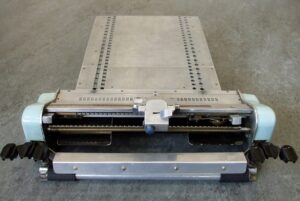
A Large Stainsby Braille Writer
The Stainsby Braille Writers are known as crab writers produced by V.L. Martin Co. Ltd. England. The carriage moves from right to left when writing producing down facing dots just as they are produced by a hand frame. Also available with reversed keys. The original Stainsby dates from the 1890’s. This is the full sized rigid version.
Pic of a Large Stainsby Braille Writer;
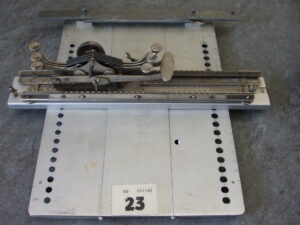
A Small Folding Stainsby
Just like above, however this one has a folding backing board making it easier to transport. Only uses half a sheet of paper.
Pic of a Small Folding Stainsby;
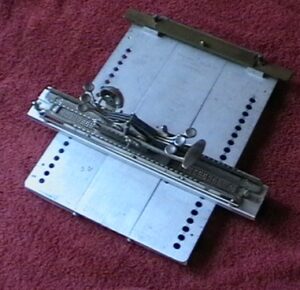
Eurotype Brailler
This is a light grey machine. Quite flat but deeper from back to front, when compared to a Classic Perkins. Also has two additional keys to either side of the recognisable six dot keys.
Pic of Eurotype Brailler:

Machines still being sourced.
A St Dunstons Brailler
A Lavender Brailler
